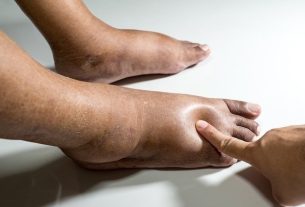Kidney stone medications, such as diclofenac, paracetamol or tamsulosin, help relieve the pain of kidney colic, prevent new attacks of colic or facilitate the elimination of the stones.
These remedies should be used under medical advice, after evaluating the symptoms, the size of the kidney stone, its location and the type of stone, as the stone can be formed by calcium, uric acid, cystine or struvite, for example. See the main types of kidney stones and how to avoid them.
Treatment of kidney stones should be carried out whenever symptoms appear, and you should consult a nephrologist or general practitioner, or go to the nearest hospital, to avoid complications of kidney stones such as blockage of the passage of urine, swelling in the kidney. or kidney infection. In some cases, the doctor may recommend surgical treatment. Find out how surgery for kidney stones is performed.

Kidney stone remedies
The main remedies for kidney stones are:
1. Nonsteroidal anti-inflammatories
Non-steroidal anti-inflammatory drugs, also known as NSAIDs, are generally the first option for kidney stone medication recommended by a doctor, as they act by reducing the production of inflammatory substances in the body, such as prostaglandins and thromboxanes, helping to alleviate colic. caused by kidney stones and pain when urinating.
Some anti-inflammatories that can be used for kidney stones are:
These remedies must be taken under medical advice, as they are not recommended during pregnancy, breastfeeding or by people who have a stomach ulcer, gastritis, serious kidney disease, chickenpox or suspected dengue fever.
2. Painkillers
Analgesics, such as paracetamol or dipyrone, are remedies indicated for colic caused by kidney stones, as they act by inhibiting the production of substances in the brain responsible for pain, such as prostaglandins or cyclooxygenases. See how to correctly take paracetamol or dipyrone.
These remedies can be found in pharmacies or drugstores, and although they are sold without the need to present a prescription, ideally they should be taken with a doctor’s advice, as they are contraindicated for people with liver problems or impaired bone marrow function. .
Furthermore, paracetamol, when used in doses greater than those recommended, can seriously affect the liver, cause drug-induced hepatitis and put life at risk. Know how to identify the symptoms of medical hepatitis.
3. Opioids
Opioids, such as morphine or tramadol, are more potent analgesics and may be recommended by the doctor for kidney stones in cases of acute, very intense pain or pain that does not improve with common analgesics, and should be used for a short period of time. .
4. Alpha-blockers
Alpha-blockers are medications normally indicated for benign prostatic hyperplasia in men with an enlarged prostate.
However, these remedies may be recommended by the doctor for kidney stones measuring between 4 and 10 mm, when the stone is found in the ureter, which is a channel that connects the kidney to the bladder, as they help to relax the muscles of the ureter, facilitating the passage and elimination of the stone, in addition to reducing pain and the recurrence of renal colic.
The main alpha-blocker that may be recommended by your doctor is tamsulosin, and should only be used if recommended by your doctor. Learn how to use tamsulosin correctly.
5. Thiazide diuretics
Thiazide diuretics, such as hydrochlorothiazide or chlorthalidone, may be prescribed by your doctor to help prevent the formation of calcium-containing kidney stones when lifestyle modifications, such as increasing fluid intake or dietary changes, do not work. are sufficient to prevent the formation of new stones. See what the diet for kidney stones should be like.
6. Potassium citrate
Potassium citrate may be recommended by your doctor to help prevent recurring kidney stones formed by calcium, uric acid or cystine, as it makes urine more alkaline, preventing the formation of stones.
However, this remedy should only be used if recommended by your doctor as depending on the type of kidney stone, it may worsen symptoms.
Remedies to dissolve kidney stones
Allopurinol is the main medicine that a doctor may recommend to help dissolve kidney stones formed by uric acid, helping to eliminate them, in addition to preventing the formation of new uric acid kidney stones.
Furthermore, the doctor may also recommend allopurinol to people who have recurrent kidney stones formed by calcium, as in most cases, high uric acid can contribute to the formation of calcium stones.
Home remedy options
Home remedies for kidney stones, such as stone-breaking tea or hibiscus tea, have a diuretic effect, which can help eliminate small stones and can be used to complement the treatment recommended by your doctor. Check out other home remedy options for kidney stones.
It is important to note that these home remedies do not replace treatment recommended by your doctor.
Which doctor to consult
The best doctor to prescribe medication to treat kidney stones is a nephrologist, as he is a kidney specialist.
Taking care of your health has never been easier!
The nephrologist will evaluate the type of stone, the severity of the condition and your health history to identify the most effective medications to relieve symptoms quickly and accelerate the dissolution of the stones. In addition, the doctor may also recommend other complementary treatments, such as laser or surgery, as necessary. Learn more about the different types of kidney stone treatment.

Sign up for our newsletter and stay up to date with exclusive news
that can transform your routine!
Warning: Undefined array key "title" in /home/storelat/public_html/wp-content/plugins/link-whisper-premium/templates/frontend/related-posts.php on line 12
Warning: Undefined array key "title_tag" in /home/storelat/public_html/wp-content/plugins/link-whisper-premium/templates/frontend/related-posts.php on line 13



